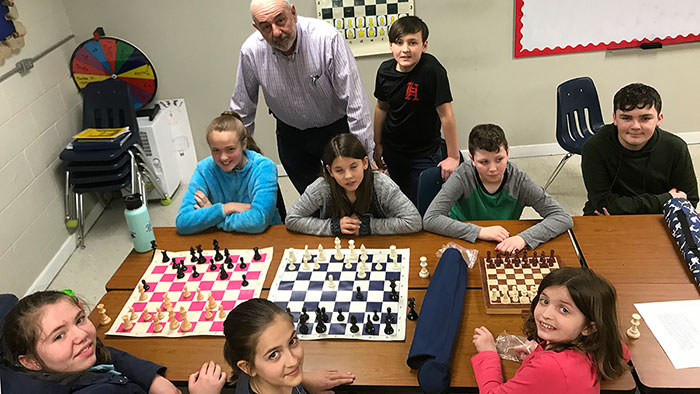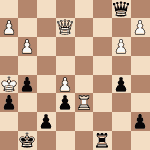
There are 5,541 players listed on US Chess in West Virginia, though that number includes inactive players, expired members, and even the deceased. West Virginia has 1.78 million residents, so a little more than .3% of residents have been, or are currently, part of US Chess. Near the end of March, I will visit West Virginia to promote chess in that state. This article shares why chess may be a good addition to schools and provides a chess puzzle from 1848.
One official state song of West Virginia is “Take Me Home, Country Roads,” most famously sung by John Denver. Around 40 years ago, I bought a John Denver cassette tape which included that song. As a teenager, I went to a concert given by John Denver in Seattle. When I was invited to West Virginia, my first thought was “Almost heaven, West Virginia,” the opening lyric of “Take Me Home, Country Roads.”

On March 27, the West Virginia Academy of Family Physicians (WVAFP) is having its annual scientific assembly. At the same location as that assembly, the Embassy Suites hotel in Charleston, I will be lecturing on the topic “Chess in the curriculum: Chess enriching academics and lifelong health.” Later that day, I will give a 20-board simultaneous exhibition. My lecture includes the following arguments for chess in schools.
According to this study at an elementary school in New Mexico, when compared with non-chess peers (same grade and same academic percentile), students who participated in chess club had improved math scores. Those who additionally played in rated tournaments saw even bigger improvement in math scores and also had improved reading scores. Such test results show that chess may be valuable to academics. However, one could make the argument that another interest, for example music, might have shown similar test results for students who play instruments, sing in extra-curricular ensembles, or enter music competitions.
Like music, chess does not require mastery of English. Both music and chess may be ideal for bringing together English-speaking and English Second Language (ESL) students. Chess is initially inexpensive; chess sets and boards cost less than musical instruments used in bands and orchestras. Even a choir usually has a piano, for accompaniment.
In tournament chess games, a tournament director does not decide who wins and who loses. Checkmate decides, and checkmate is determined by each game’s players. In music competitions, judges decide which musicians earn which marks. Thus, chess teaches children to take full responsibility for their results as they cannot blame those results on judges.
As a music-lover and as the mother of a public school music teacher, I support music in schools. As a chess promoter, I will present the above arguments, and others drawn from my seven books, about why chess, like music, may deserve a place in schools.
My lecture’s audience members may or may not be chess players. Yet I always like to include actual chess problems, to give audience members a sense of the enticing mental struggle that is chess. One of the problems that I will present in West Virginia is the Eight Queens puzzle, which only requires knowledge of how a queen moves. Adults can learn pretty quickly that the queen moves vertically, horizontally, and diagonally. The Eight Queens puzzle was first published in 1848 and asks you to place eight queens on a chess board such that no queen is attacking another queen.
If you don’t have eight queens available, you can use pawns or coins to represent queens. This animation gives you an idea of what you are attempting; if you watch it until the end, it gives an answer too.


If you will be in Charleston, West Virginia on March 27, and want to participate in my lecture or simultaneous exhibition, please contact WVAFP Executive Vice President Gerry D. Stover at gerry.stover@wvafp.org or call WVAFP’s office at 304-562-4433 to reserve your seat. Even if you cannot join me in West Virginia, I hope this article provided responses for the next time someone asks you, “Why should chess be in schools?”
Due to the risks inherent in large gatherings because of COVID-19, Alexey Root’s trip to West Virginia has been cancelled.
